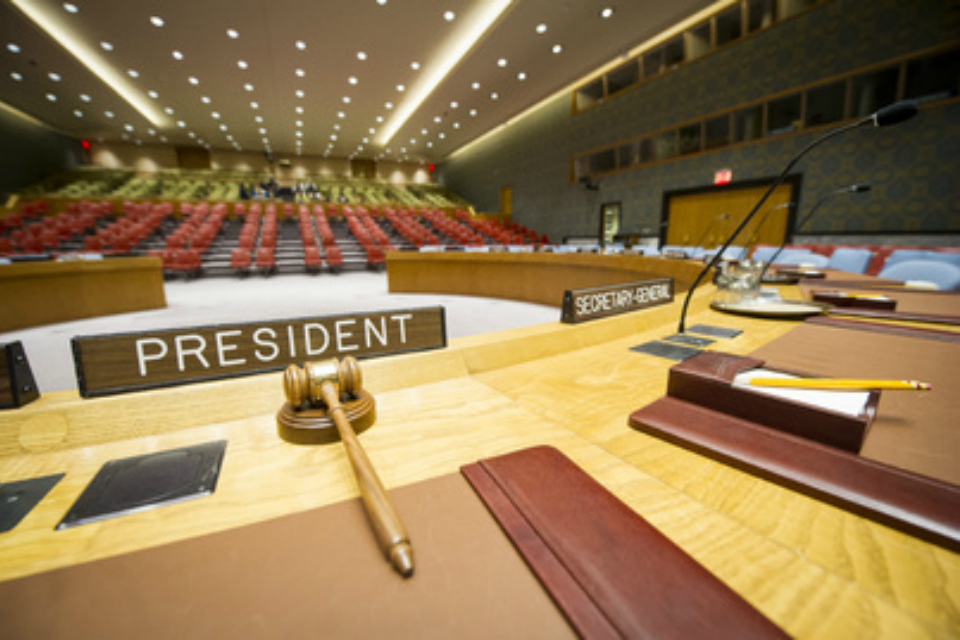"We remain committed to partnering with Nigeria and its neighbours to degrade and defeat Boko Haram"
Statement by Ambassador Matthew Rycroft, UK Permanent Representative to the United Nations at the Security Council briefing on the Lake Chad Basin

Thank you Mr President and thank you Under-Secretary-General Feltman for your valuable briefing. And thank you to Fatima on the phone for sharing your thoughts.
It was six months ago in a dusty IDP camp in Maiduguri that we heard her testimony – together with that of many others – and it really brought home to me, and I think probably to several of us who were there, the human cost of the crisis in the Lake Chad Basin. So it’s very good to hear from Fatima again today and it’s vital that the Council continues to hear from those most affected by the issues on our agenda and continues to use that analysis, and those from-the-heart interventions, to inform our decision making.
Sadly, as both Fatima and the Secretary-General’s report make clear, six months on from our visit to the Lake Chad Basin, and the situation remains deeply troubling. Yes, Boko Haram has been degraded, yes territory has been reclaimed, but Boko Haram is far from a spent force. They are down but not out, shifting their tactics from land grabs to opportunistic attacks.
Maiduguri now faces weekly suicide attacks, many from girls forced to be suicide bombers. Over 400 people have been killed since we visited. And Boko Haram’s shameful, sickening abductions of young women and girls continues unabated. Those that return continue to face stigma and discrimination, which is why the UK will host a ministerial event here on the 18th of September to launch a new set of global principles to tackle such stigma.
The continuing barbarity is only exacerbating the humanitarian crises. Since we visited, the number of Nigerians seeking refuge in neighbouring countries has only marginally decreased, with nearly 2 million people still displaced in North East Nigeria and over 8 million in need of urgent, life-saving assistance. And while the numbers of forced returns have fallen, we have seen thousands of people pressured back into areas where they don’t feel safe.
So it’s clear that we should all redouble our efforts to implement the commitments that we made in resolution 2349. The UK will play our part. We remain committed to partnering with Nigeria and its neighbours to degrade and defeat Boko Haram. We remain committed to helping people in need in the region, having scaled up our humanitarian support to 130 million dollars this year and announced an additional 260 million over four years, as part of the North East Nigeria Transition to Development programme.
But we all need to play our part. The Nigeria Humanitarian Fund launched in February with an appeal for 1 billion dollars this year. As of last month that appeal is less than half funded. As the Secretary-General’s report makes clear, insufficient funding from the donor community continues to limit the provision of food aid, development and recovery activities.
And just as the international community must act, so too should governments in the region. We look to the Government of Nigeria and affected countries to provide greater resources where they can and to further prioritise the humanitarian response. We also call on them to expedite all remaining registrations for humanitarian organisations in the region, as the Secretary-General’s report notes. We welcome the increased civil-military coordination in the humanitarian effort and urge this to continue. However we deeply regret the raid on the UN Red Roof Compound by the Nigerian military last month, though we do welcome the swift response by the authorities.
It’s clear Mr President that a long term solution will only be found through addressing the root causes which led to Boko Haram’s emergence. That, I think, was the main lesson for many of us on our visit. That search for the longer term root causes requires a regional plan to address the political, economic, governance, transparency and accountability issues. And if such an effort is to succeed, it must respect human rights. The ongoing reports of torture, arbitrary arrest and sexual exploitation are deeply concerning and must stop. So we support calls for greater funding to strengthen the UN’s monitoring presence on the ground.
Finally, the role of women in this crisis cannot be overlooked. We reiterate the Council’s call for greater engagement between regional governments, the Multinational Joint Task Force and women’s civil society, as well as deployment of a gender advisor to the MNJTF.
So in short, Mr President, there is a lot more that all of us need to do. Six months on from our visit, we cannot afford to lose focus. I hope that through briefings like the one we’ve heard today from Fatima and from Jeff, we will all be reminded of what is at stake, just as we were in Maiduguri. Thank you.